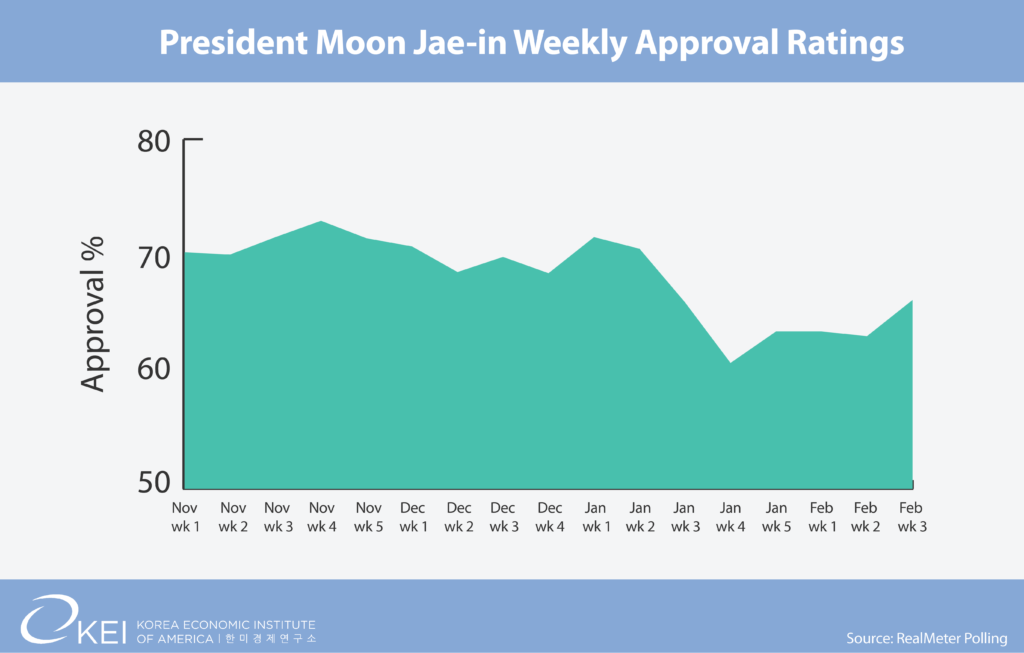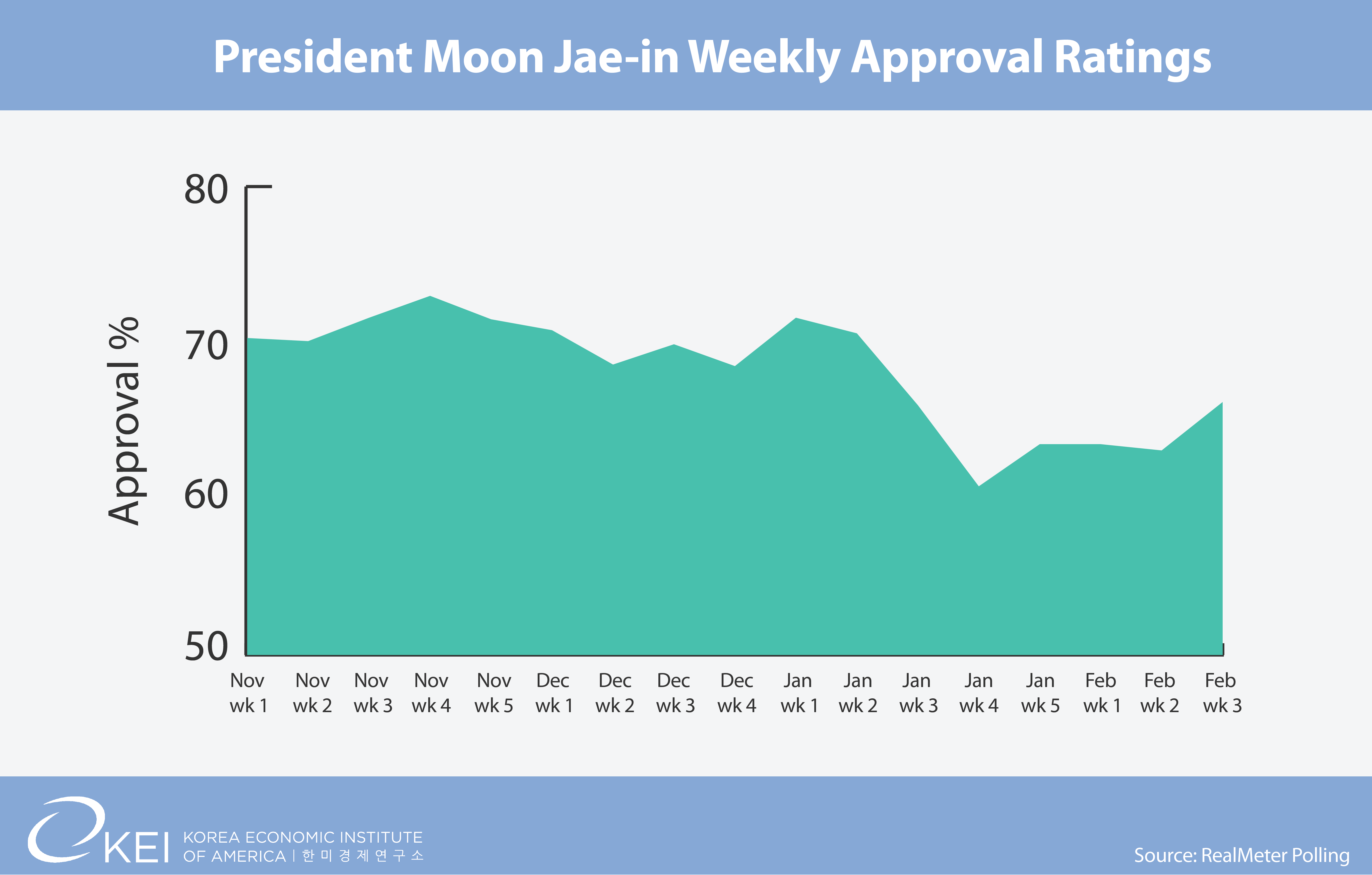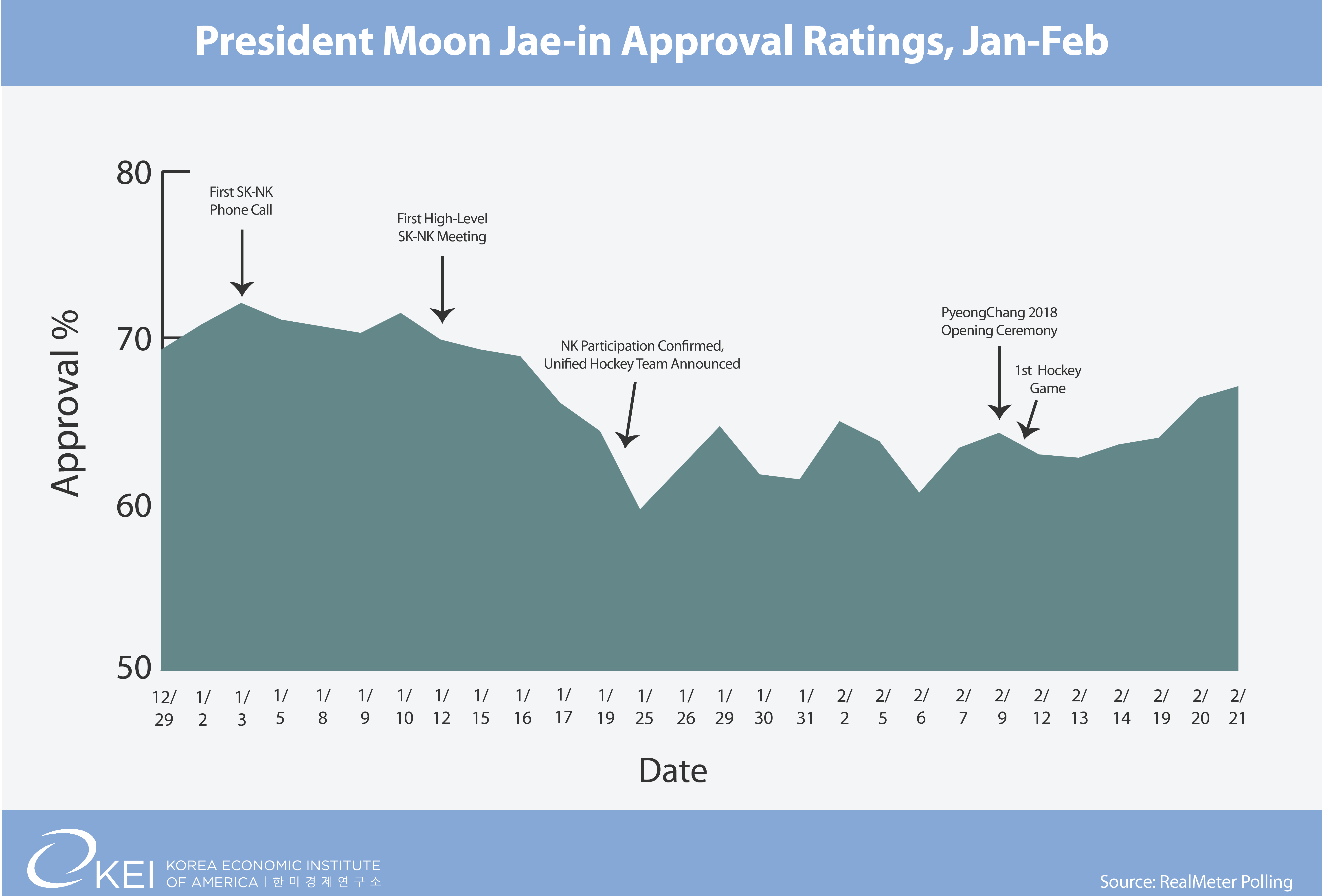The Peninsula
Olympic Clouds Over Moon’s Approval Ratings?

By Jenna Gibson
Up until the last few weeks, the South Korean public has given President Moon Jae-in an overwhelming mandate. But his recent engagement with the North Koreans as part of the PyeongChang Olympics brought mixed reviews, and lowered his previously sky-high approval ratings, raising concern that his overtures to Pyongyang may isolate Korean moderates. But was that the case?
Although he was elected with only 41 percent of the vote last May, President Moon started his tenure with an 84 percent approval rate in June. This number then hovered around 80 percent for a few months before slowly dipping into mid-to low 70s, where it stayed through October. For reference, Moon’s predecessor, Park Geun-hye, began her tenure at 45 percent approval, reaching a high of 68 percent about 7 months into her presidency before dropping back into the 30s and 40s, where she remained for most of her time in the Blue House. And her predecessor, Lee Myung-bak, quickly dropped from a 50 percent approval rate to a low of around 20 percent in the first few months of his presidency.

After his impressive start, though, Moon’s Olympic diplomacy caused significant pushback from the Korean public. In the second and third weeks of January, as Moon’s government began sitting down with their North Korean counterparts to hash out the details of their PyeongChang cooperation, Moon’s approval numbers started sliding, dropping into the low 60s for the first time in his presidency and hitting a low of 59.7 percent on January 25, the first poll conducted after the January 20 meeting where the International Olympic Committee approved North Korea’s participation in the Games and officially created the unified women’s hockey team.

As the approval numbers indicate, initial response to President Moon’s overtures was mixed, with many young people (a key part of Moon’s base) expressing frustration that after all the work their country had done to prepare for the event, they wouldn’t even get to show off their own flag during the Opening Ceremony. Conservative groups protested the move, and one Liberty Party lawmaker even declared that the PyeongChang Olympics had become the Pyongyang Olympics.
Korea’s Prime Minister didn’t help – on January 16, when the idea to combine the women’s hockey teams was still being discussed, he told reporters that people should be ok with the idea because the team was ranked 22nd in the world, and therefore was “not in medal contention.” His comments drew ire not only for their condescension, but also because they highlighted the sexism inherent in the decision – the Korean men’s hockey team is currently ranked 21st in the world, but were not forced to accept North Korean players with two weeks’ notice. According to The New York Times, a petition on the Blue House website opposed to the unified team reached 50,000 signatures, and a Realmeter poll conducted in mid-January found that 60 percent of South Korean respondents opposed marching under the unified Korean flag.
However, after taking a dip amid the announcements about North Korea’s participation, as the Games officially got underway the Korean public seemed prepared to give Moon’s plan a chance. His approval rating remained steady in the mid-60s throughout the beginning of the Games, and now in the third week of February, his numbers seem to be on a tentative upward trajectory, reaching 66 percent for the first time since mid-January.
Interestingly, the dip in his approval ratings comes from across the political spectrum. According to Gallup polling, members of Moon’s progressive Minjoo Party who approved of the president’s performance dropped from 97 percent in the first week of January to 89 percent in the first week of February, bouncing back to 92 percent this week. On the other side of the political spectrum, however, he saw similar losses – dropping from a 27 percent approval among Liberty Korea Party members at the beginning of January to 15 percent in the first week of February and 17 percent in the fourth week of February. Moderates and those without a political affiliation saw only minor fluctuations in their approval over that time period. These results call into question the assumption that Korean progressives are all staunchly pro-engagement.
Post-Olympics, Moon will have to play his cards carefully to avoid isolating parts of the public further and to maintain his strong domestic political mandate. With North Korea’s Kim Yo-jong passing along an official invitation for President Moon to visit Pyongyang and with the North Koreans leaving the door open for possible talks with the United States, it seems Moon’s Olympic diplomacy is only just getting started. What remains to be seen, however, is if the South Korean public will return to their overwhelming support for the president, or continue to be skeptical of these moves.
Jenna Gibson is the Director of Communications at the Korea Economic Institute of America. The views expressed here are the author’s alone.
Photo from the Republic of Korea’s photostream on flickr Creative Commons.
